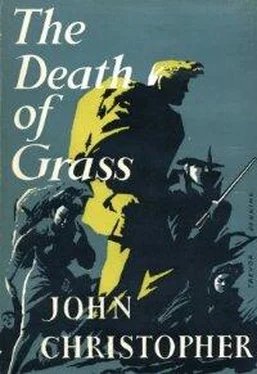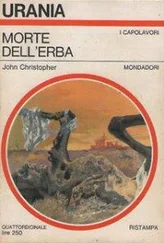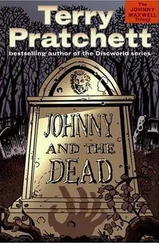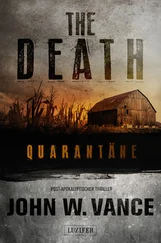John did not answer at once. His gaze took in the hall, invaded now by a new rush of boys from another class-room. When he turned back to Ann, he said:
“You do know what you’re doing, don’t you, darling? I suppose we’re all changing, but in different ways.”
She said defensively: “I shall have the children to cope with, you know, while you’re being the gallant warrior with Roger and Mr Pirrie.”
“I can’t insist, can I?” John asked.
Ann looked at him. “When you told me—about Miss Errington, I thought it was dreadful. But I still hadn’t realized what was happening. I do now. We’ve got to get to the valley, and get the children there as well. We can’t afford any extras, even this boy.”
John shrugged. Davey came back, carrying a small attaché case; he had a brisk and happy look and resembled a small-scale Government official. Spooks trailed behind him.
Davey said: “I’ve got the important things, like my stamp-album. I put my spare socks in, too.” He looked at his mother for approval. “Spooks has promised to look after my mice until I get back. One of my does is pregnant, and I’ve told him he can sell the litter when they arrive.”
John said: “Well, we’d better be getting along to the car.” He avoided looking at the gangling Spooks.
Olivia, who had taken no previous part in the conversation, broke her silence. She said:
“I think Spooks could come along. Would you like to come with us, Spooks?”
Ann said: “Olivia! You know…”
Olivia said apologetically: “I meant, in our car. We only have the one child, after all. It would only be a matter of evening things up.”
The two women stared briefly at each other. On Ann’s side there was guilt again, and anger moved by that guilt. Olivia showed only shy embarrassment. Had there been the least trace of moral condescension, John thought, it would have meant a rift that the safety of the party could not afford. As it was, Ann’s anger faded.
She said: “Do as you like. Don’t you think you ought to consult Roger, though?”
Davey, who had been following the interchange with interest but without understanding said:
“Is Uncle Roger here, too? I’m sure he’d like Spooks. Spooks is ferociously witty, like he is. Say something witty, Spooks.”
Spooks stared at them, in agonized helplessness. Olivia smiled at him.
“Never mind, Spooks. You would like to come with us?”
He nodded his head slowly up and down. Davey grabbed him by the arm. “Just the job {85} 85 just the job: exactly right
!” he exclaimed. “Come on, Spooks, I’ll go and help you pack now.” For a moment he looked thoughtful. “What about the mice?”
“The mice,” John ordered, “remain behind. Give them away to someone.”
Davey turned to Spooks. “Do you think we could get sixpence each for them, off Bannister?”
John looked at Ann over their son’s head; after a moment, she also smiled. John said:
“We’re leaving in five minutes. That’s all the time you have for Spooks’s packing and your joint commercial transactions.”
The two boys prepared to turn away. Davey said thoughtfully: “We should get a bob at least for the one that’s pregnant.”
They had expected to be stopped on the roads by the military, and with that possibility in view had devised three different stories to account for the northward journeys of the three cars; the important thing, John felt, was to avoid the impression of a convoy. But in fact there was no attempt at inquisition. The considerable number of military vehicles on the roads was interspersed with private cars in a normal and mutually tolerant traffic. After leaving Saxon Court, they made for the Great North Road again, and drove northwards uneventfully throughout the morning.
In the late afternoon, they stopped for a meal in a lane, a little north of Newark. The day had been cloudy, but was now brilliantly blue and sunlit, with a mass of cloud, rolling away to the west, poised in white billows and turrets. The fields on either side of them were potato fields planted for the hopeful second crop; apart from the bareness of hedge-rows empty of grass, there was nothing to distinguish the scene from any country landscape in a thriving fruitful world.
The three boys had found a bank and were sliding down it, using for a sleigh an old panel of wood, discarded probably from some gipsy caravan years before. Mary watched them, half envious, half scornful. She had developed a lot since the hill climbing in the valley of fourteen months before.
The men, sitting in Pirrie’s Ford, discussed things.
John said: “If we can get north of Ripon today, we should be all right for the run to the valley tomorrow.”
“We could get farther than that,” Roger said.
“I suppose we could. I doubt if it would be worth it, though. The main thing is to get clear of population centres. Once we’re away from the West Riding, we should be safe enough from anything that happens.”
Pirrie said: “I am not objecting, mind you, nor regretting having joined you on this little trip, but does it not seem possible that the dangers of violence may have been over-estimated? We have had a very smooth progress. Neither Grantham nor Newark showed any signs of imminent breakdown.”
“Peterborough was sealed off,” Roger said. “I think those towns that still have free passage are too busy congratulating themselves on being missed to begin worrying about what else may be happening. You saw those queues outside the bakeries?”
“Very orderly queues,” observed Pirrie.
“The trouble is,” said John, “that we don’t know just when Welling is going to take his drastic action. It’s nearly twenty-four hours since the cities and large towns were sealed off. When the bombs drop, the whole country is going to erupt in panic. Welling hopes to be able to control things, but he won’t expect to have any degree of control for the first few days. I still think that, providing we can get clear of the major centres of population by that time, we should be all right.”
“Atom bombs, and hydrogen bombs,” Pirrie said thoughtfully. “I really wonder.”
Roger said shortly: “I don’t. I know Haggerty. He wasn’t lying.”
“It is not on the score of morality that I find them unlikely,” said Pirrie, “but on that of temperament. The English, being sluggish in the imagination, would find no difficulty in acquiescing in measures which—their common sense would tell them—must lead to the death by starvation of millions. But direct action—murder for self-preservation—is a different matter. I find it difficult to believe they could ever bring themselves to the sticking-point.”
“We haven’t done so badly,” Roger said. He grinned. “You, particularly.”
“My mother,” Pirrie said simply, “was French. But you fail to take my point. I had not meant that the English are inhibited from violence. Under the right circumstances, they will murder with a will, and more cheerfully than most But they are sluggish in logic as well as imagination. They will preserve illusions to the very end. It is only after that that they will fight like particularly savage tigers.”
“And when did you reach the end?” Roger asked.
Pirrie smiled. “A long time ago. I came to the understanding that all men are friends by convenience and enemies by choice.”
Roger looked at him curiously. “I follow you part of the way. There are some real ties.”
“Some alliances,” said Pirrie, “last longer than others. But they remain alliances. Our own is a particularly valuable one.”
The women were in the Buckleys’ car. Millicent now put her head out of the window, and called out to them:
Читать дальше












